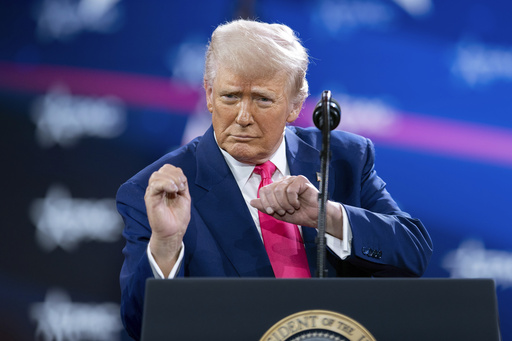
WASHINGTON — The fifth week of President Donald Trump’s second term marked a significant transformation in U.S. relations with Russia. This included the dismissal of a top military official, a friendly interview with entrepreneur Elon Musk, and a move towards more control over independent regulatory bodies.
Trump acknowledged the return of inflation but suggested that his relatively brief time back in office was not to blame for ongoing high prices. Experts caution that this deflection may prove ineffective if the economic situation does not improve, with consumer confidence indicating a grim outlook.
Here’s an overview of the current state of affairs following Trump’s first month in office:
Shift in Russian Policy
Trump assigned his senior foreign policy team to engage with Russian officials in Saudi Arabia in an effort to negotiate an end to the conflict in Ukraine. Notably, these discussions excluded representatives from Ukraine and Europe, an omission that has escalated tensions with Ukrainian President Volodymyr Zelenskyy.
Since Russia’s invasion of Ukraine began in February 2022, the previous Democratic administration adhered to the principle of “nothing about Ukraine without Ukraine.” In contrast, Trump’s administration has abandoned this approach, intensifying efforts to find a resolution to the conflict.
Zelenskyy critiqued Trump for operating within a framework of Russian disinformation, while Trump disparaged Zelenskyy as a “dictator” and insinuated Ukraine was responsible for the war’s inception, although he later conceded that Russia had initiated the attack.
Trump expressed a desire to meet with Russian President Vladimir Putin soon, with preparations reportedly underway. He argued that the war has resulted in substantial loss of life and financial expenditure by the U.S. on military aid for Ukraine, stating, “I’m not trying to make Putin nicer or better… war should have never happened” if he had won the 2020 election.
These remarks have raised concerns among European allies and may lead to some diplomatic discomfort during upcoming visits from French President Emmanuel Macron and British Prime Minister Keir Starmer.
Pentagon Changes Amid Financial Discussions
In an unprecedented action, Trump dismissed Air Force Gen. CQ Brown Jr., the first African American to hold the position of chairman of the Joint Chiefs of Staff. This decision aligns with Trump’s goal to reshape military leadership perceived to back diversity and equality initiatives.
In announcing the firing, Trump praised Brown but his departure has startled Pentagon officials, marking a broader trend of dismissals within the Department of Defense.
Simultaneously, Musk’s team at the Department of Government Efficiency has enacted significant reductions across federal departments. Recently, Musk directed federal employees to report their achievements, threatening non-compliant staff with presumed resignations.
Despite some successes, financial figures reported have been questioned for accuracy and consistency. Trump, however, proposed reinvesting up to 20% of savings generated back to taxpayers. Musk suggested potential rebate checks, although achieving this would likely require monumental cuts to essential programs like Social Security.
During a nationally televised interview, Trump expressed admiration for Musk, while Musk controversially brandished a chainsaw at a conservative conference to symbolize his commitment to fiscal austerity. Nevertheless, recent filings indicated Musk was not officially leading the Department of Government Efficiency, despite Trump’s assertions.
Public Sentiment on Economic Conditions
In an executive order signing, Trump positioned the White House to take charge of independent regulatory agencies, including key financial committees like the SEC and FTC, claiming the economy was primed for growth. However, consumer sentiments reflect growing pessimism due to tariff threats, mass job layoffs, and ambiguity regarding fiscal policy.
Reports showed a significant drop in consumer confidence, with the University of Michigan’s index down nearly 10%. Republican sentiments still trend more positively compared to Democrats, yet even GOP figures have experienced declines in their overall outlook since 2016, when Trump ascended to power amid a backdrop of economic dissatisfaction.
Walmart also experienced stock declines following disappointing earnings forecasts that hinted at slower growth due to trade implications, demonstrating lingering consumer anxieties about economic stability.
Future Goals and Congressional Dynamics
Trump continues to promote an agenda of expansive funding bills targeting priorities from border security to tax cuts realized during his previous presidency. However, evidence suggests he may be reconsidering the necessity for a singular large bill.
Indications of movement emerged when Senate Republicans backed a budget blueprint allocating $342 billion for border security, suggesting tax measures may be deferred. However, there is discord within the House, where Speaker Mike Johnson advocates for a more comprehensive strategy that would include tax cut extensions, risking a deficit of over $4.5 trillion over ten years.
This creates a precarious balancing act for Johnson, who controls a slim House majority, with dissenting views over proposed budget cuts that could negatively impact both constituents and social programs. Should the House fail to coordinate its efforts, pressure will mount to align with the Senate’s strategies.

